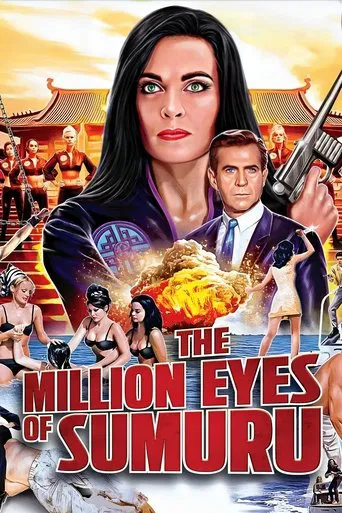

Good concept, poorly executed.
... View MoreA Disappointing Continuation
... View MoreWhile it doesn't offer any answers, it both thrills and makes you think.
... View MoreGreat example of an old-fashioned, pure-at-heart escapist event movie that doesn't pretend to be anything that it's not and has boat loads of fun being its own ludicrous self.
... View MoreThe Million Eyes of Sumuru is another movie produced by exploitation maven Harry Alan Towers. Like quite a few of his others it has a unique combination of low budget with exotic location shooting. In this case the action takes place in Hong Kong. The title character is Sumuru (essentially a female Fu Manchu) who plans on ruling the world by using her army of gorgeous women who go out individually and kill all of the world's leading men after getting up close and personal with them by way of their considerable female charms. These 'unfortunate' male saps are then dispatched by a device that turns them into stone. Anyway, via this grand plan Sumuru will take over the world somehow.This is one of the films that surfed the wave of success created by the James Bond movies which were massive in the 60's. To that end it has a very agreeable combination of exotic locations and hot premier division women. The very fact that the plot-line to this one actively focuses on a woman with an army of babes meant that this one got plus points from me more or less straight away. The 60's glamour essentially is what makes this one work for me. From the thrills and spills side of the fence it's pretty half-hearted, this is a film after all which could be summed up with the word 'breezy', so it's best not to go into this one expecting any pulse pounding action.The star of the piece is Shirley Eaton in the role of Sumuru. She would go on to forever be known as the lady painted gold in the earlier Bond classic Goldfinger (1964) but it's nice to see her get a starring role here (she also repeated the role in the follow up movie The Girl from Rio (1969), which is another poorly rated film which I happen to like a lot more than most others it seems). This one also benefits from the appearance of two other cult film stars in the beautiful Maria Rohm as a female agent (who is 'turned' by the main 'hero' who was not much more than a sex-pest I thought) and we also have Klaus Kinski appear as one of the high ranking men who is targeted by Sumuru, he even gets to sport a very silly wig in the process. On the whole, this is a movie which seems to have something of a bad reputation which I personally think is somewhat unfair. It has beautiful women, exotic locations and breezy action. That might not be enough for some but it was enough for me.
... View MoreThe IMDb-rating (3.0 at the time I write this review) is plain ridiculous, that's why I give this movie a write-up. Of course, it's cheesy and silly but no different from other spy comedies from the 60s, say the Matt Helm flicks. And the production values are much higher; there's good location shooting and beautiful sets, plus good camera work (I watched the wide-screen version). Capable acting there is little, but the pretty female cast makes a bit up for that. The music is nothing special and the movie definitely has some lengths despite the snappy running-time.SPOILERS: The main problem is probably that the "hero" never gets much to do (James Bond would have freed himself in the final act - well, I guess our hero waiting passively for his rescue is part of the spoof but it was a lousy decision, tension-wise). Secondly, the villain organisation, basically a small army of nubile young women aimed at creating a men-free reign, is doomed to fail from the start (in fact, one wonders how it ever got that big) because none of the pretty members, from leader to lowest rung, is able to keep her wits about her when left alone with a healthy male. That's a nice running gag at first but gets simply ridden to death. So overall, it's just a minor B-movie despite the high production values.But if you like other 60s spy comedies (say, Liquidator or the Matt Helm outings), you'll like this one well enough. It's even a valid spoof of early James Bond in many scenes.
... View MoreTHE MILLION EYES OF SU-MURU is one of the millions of Harry Alan Towers-produced movies made during the 1960s that were usually filmed in various exotic locations; Hong Kong was the choice for this one. Based on a Sax Rohmer story, this is a film which serves to emulate the popularity of the Christopher Lee-starring Fu Manchu movies which were being made at the same time, except with an all-female twist.Sadly, it's a bit of a boring affair, a definite case of style over substance and a film which feels rather insipid and tame when watched with modern eyes. Shirley Eaton (GOLDFINGER) is the titular foe, who sends her all-woman army out to kill various world leaders in a bid for world domination. Only two men can stop her: the wooden George Nader (ROBOT MONSTER) and the equally wooden singer-turned-actor Frankie Avalon.What follows is light, fluffy, and predictable, and this feels much like the Italian Bond rip-offs that flooded cinemas during the late '60s. There are lots of beautiful Euro starlets wandering around showing acres of flesh, a typically bizarre cameo role for Klaus Kinski, and Wilfrid Hyde-White propping up the scenery as he did in many a Towers-produced film. Fans of '60s kitsch might find something to enjoy here, but those who require more substance should look elsewhere. A Jess Franco-helmed sequel, THE GIRL FROM RIO, followed.
... View MoreI could barely stand to watch this movie. Frankie Avalon is irritating as the comic relief sidekick, and George Nader is the creepy, smug, smarmy 'hero.' I found myself hoping they would get killed a quarter way into the movie. The villainesses in this movie are false eyelashed, tightly outfitted (practical for spy maneuvers), and brainless in that sixties spy movie way. If they were trying to make a farce, they failed because it is not funny. If they were trying to make a 'straight' spy movie, they failed because it is horrendously lacking. I cannot recommend one thing about this movie. I originally saw this movie as part of the original KTMA season of Mystery Science Theater 3000. I felt that they had trouble even mocking this movie.
... View More